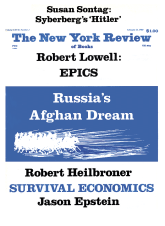In response to:
Paradise Regained from the December 20, 1979 issue
To the Editors:
Lest the worthy Gore Vidal (“Paradise Regained,” NYR, December 20) be accused of attempting proof by selected evidence, I think it only balanced that the words of other experts writing in journals equally as distinguished as your own be cited concerning the scholarship of author, Idries Shah. Here are five instances, all more recent than 1970 (the date of Mr. Vidal’s single attribution):
- “The author, for long recognized as the leading interpreter of Sufi methods and practice to the Western world, has gathered together from many different sources a series of anecdotes and stories, some recorded and others orally transmitted, which illustrate the ancient but still continuing instructional work of the men known in Europe from the Middle Ages onwards as the illuminati.”
The Times Literary Supplement, 1971
- “It would seem that the accusation of ‘popularization’ which is often levelled against this author by his critics in the Western world carries little weight with Eastern scholars, who are generous in their praise of his capacity for accurately expressing Sufi thought and practice in vivid terms easily comprehensible to readers of English.”
Asian Affairs, Journal of the Royal Central Asian Society, 1972
- “We owe a great debt to Idries Shah.”
Sir John Glubb
Sufi Studies: East and West, 1973
- “I would like to underscore the seriousness of Idries Shah’s scholarship and literary talents.”
Professor James Kritzeck, Head of the Institute for Advanced Religious Studies and Professor of Oriental Languages and History, University of Notre Dame, 1973
- “His translations are exceptionally clear and digestible to the modern reader. The stories provide templates to which we can match our own behaviour.”
Dr. Arthur J. Deikman
The Journal of Nervous and Mental Disease, 1977
Ramsay Wood
Frame Up Limited
Wembley, Middlesex
England
Gore Vidal replies:
Mr. Ramsay Wood’s letter has that authentic Silly Seventies ring. Take point number one. The sentence that he quotes from the Times Literary Supplement is a neutral description of what sounds to be a book. To call the dread Idries Shah a “leading interpreter of Sufi methods,” etc. is not to praise but to describe him. After all, the equally dread Miss Anita Bryant is a leading interpreter of homosexual methods and practices. Point two is mysterious. No data is given. The dread I.S. is acknowledged to have unnamed detractors but he also has unnamed Eastern admirers. Who are they? Indira and Sanjay Gandhi? The Rajput of Jaipur? Pol Pot? Point three is bleak and mysterious. What is this great debt that we owe? If still alive, Sir John Glubb (Pasha to his fierce desert troops) must speak out. If dead, well…he will find a way. Point four is defensive. Why should Professor Kritzeck feel obliged to “underscore” the dread I.S.’s seriousness? Although The Journal of Nervous and Mental Disease can do no wrong in my eyes, Dr. Deikman seems more interested in therapeutic medicine than in the wisdom of the East. Translations, he tells us, are “clear and digestible.” To be taken before or after meals? As for those templates…. A template is that ruler-like thing with holes in it which you use when you want to mark a flat surface evenly in order to drill holes. Is that clear, digestible? All right. Dr. Deikman now wants you to place a story-template over your behavior in order to see if…. What? The holes match? This is all very Eastern. We have had nothing like it in the West (Side of New York) since back in the Fifties when it was observed of a fond but demented couple that the rocks in his head fit the holes in hers.
This Issue
February 21, 1980



